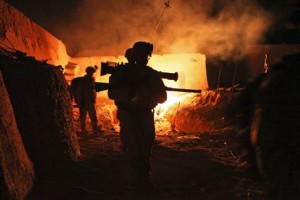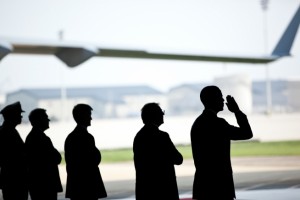Pitching the ‘Forever War’ in Afghanistan
Exclusive: Rather than rethink U.S. policy in the Mideast, particularly the entangling alliances with Israel and Saudi Arabia, Official Washington pushes schemes to perpetuate the “forever war” in Afghanistan, writes James W Carden.
By James W Carden
In May, the founder of the mercenary-for-hire group Blackwater (now since remained Academi), Erik Prince took to the pages of the Wall Street Journal to propose that the Pentagon employ “private military units” and appoint a “viceroy” to oversee the war in Afghanistan.

U.S. Marines leaving a compound at night in Afghanistan’s Helmand province. (Defense Department photo)
According to Prince, who has been actively lobbying for what he calls an “East India Company approach” as the solution to America’s longest war (16 years, $117 billion and counting), “In Afghanistan, the viceroy approach would reduce rampant fraud by focusing spending on initiatives that further the central strategy, rather than handing cash to every outstretched hand from a U.S. system bereft of institutional memory.” (Prince naturally failed to say if his were among those “outstretched hands”)
On July 10, The New York Times reported that Prince and the owner of the military contractor Dyn Corporation, Stephen Feinberg, have, at the request of Stephen K. Bannon and Jared Kushner, been pushing a plan to, in effect, privatize the war effort in Afghanistan. (In recent weeks both The Nation and The American Conservativehave published deep-dive investigative pieces into the behind the scenes machinations of would-be Viceroys Prince and Feinberg).
According to the Times report “The strategy has been called ‘the Laos option,’ after America’s shadowy involvement in Laos during the war in neighboring Vietnam.”
If so, then “the Laos option” is an unfortunate moniker for their strategy given the fact that the during America’s war over Laos (1964-73) the U.S. dropped 2.5 million tons of munitions on that country as part of the failed effort in Vietnam, which finally ended when the U.S. embassy in Saigon was evacuated in 1975.
It is worth mentioning, since we so often overlook the “collateral damage” caused by our overseas adventures, that in the 40-plus years since the cessation of operations in Laos that 20,000 Laotians have been killed by unexploded ordinance dropped that had been dropped during that illegal nine-year campaign.
And while Prince and Feinberg have (so far anyway) gotten the cold shoulder from National Security Advisor H.R. McMaster and Pentagon Chief James Mattis, momentum is picking up for once again ramping up American involvement in Afghanistan among some of the (allegedly) more sophisticated members of the foreign policy establishment.
More Armchair Warmongering
On July 11, former Deputy Defense Secretary Michele Flournoy and think tank functionary Richard Fontaine published a piece for the purportedly realist National Interest magazine that attempted to assure readers that “The Afghan War Is Not Lost.” Why not? Because even though there are roughly 8,400 U.S. troops in Afghanistan, “More troops can help achieve American objectives in Afghanistan, but only if they are part of a larger and more effective strategy.” [Emphasis mine].

Seen through a night-vision device, U.S. Marines conduct a combat logistics patrol in Helmand province, Afghanistan, April 21, 2013. (U.S. Marine Corps photo by Sgt. Anthony L. Ortiz)
The stress on more troops (if not to say, thousands upon thousands of unaccountable mercenaries in the pay of Feinberg and Prince) is deeply concerning because if anyone can be said to be a reliable barometer of prevailing opinion inside the Beltway it is Flournoy.
Readers may recall that Flournoy co-chaired the Obama administration’s Afghanistan policy review, which led to the President’s ill-fated December 2009 decision to send 33,000 American troops (plus a contingent of 7,000 from NATO) to prop up the Karzai regime in Afghanistan. The following year, 2010, would end up as the bloodiest one yet for coalition forces in Afghanistan. Indeed, nearly three-fourth of all American casualties in that war took place in the years following Obama’s decision to “surge” in Afghanistan.
But give Flournoy (who was at the top of Hillary Clinton’s short list to be Defense Secretary) credit: she persists. Today Flournoy and her frequent co-author Fontaine (both are executives of the hawkish think tank Center for a New American Security) say that American should commit to Afghanistan “indefinitely”:
“The centerpiece of the administration’s Afghanistan strategy must therefore be a clear and sustained American commitment to Afghanistan. By forswearing deadlines and making clear that the United States will support the Afghan government and security forces indefinitely and until they are able to hold their own, Washington can telegraph to the Taliban that it will not succeed in retaking the country.”
Worryingly, some members of Congress seem to be on board. In early July, a bipartisan delegation including Senators John McCain, Lindsey Graham and Elizabeth Warren toured Pakistan and Afghanistan and called for greater military involvement in the region. Speaking on behalf of the delegation, McCain noted, “none of us would say that we’re on course to a success here in Afghanistan.”
The Forever War
Driving the push to send more troops is the fact that, as Flournoy and Fontaine point out, the “Taliban today controls more territory than at any time since 9/11. Faced with corruption and exclusionary politics, popular opposition to the government in Kabul is rising, while the Taliban makes inroads in rural areas and, increasingly, near the cities.” This is no doubt the case.

President Barack Obama saluting coffins of dead U.S. soldiers returned from Afghanistan to Dover Air Force Base. (White House photo by Pete Souza)
And proponents of the forever war in Afghanistan are correct when they say, as they inevitably do, that the Taliban provided sanctuary to Obama bin Laden and Al Qaeda in the lead up to 9/11. But these same proponents usually neglect to note that bin Laden and Al Qaeda were motivated by the U.S.-Israeli special relationship and, according to the 9/11 Report, “grievances against the United States” that were “widely shared in the Muslim world.” Bin Laden “inveighed against the presence of U.S. troops in Saudi Arabia … and against other U.S. policies in the Middle East.”
But, in the intervening years between 2001 and now, Al Qaeda’s leadership has been decimated, and according to a Brown University study, “the United States has spent or taken on obligations to spend more than $3.6 trillion in current dollars on the wars in Iraq, Afghanistan, Pakistan and Syria and on the Department of Homeland Security” in the years following 9/11.
Meanwhile other alternative strategies (such as the “offshore balancing strategy” advocated by John Mearsheimer and Stephen Walt) have never been tried. As I wrote at Consortiumnews in June, “there are alternatives (there always are). It’s just that these tend not to have the institutional backing of Washington’s policy/think tank community which, because it is deeply compromised by its defense industry funders, rarely given them voice or consideration.”
If the U.S. is to successfully combat terrorism emanating out of the Middle East a wholesale re-evaluation of U.S. policy is in order, particularly with regard to Israel and Saudi Arabia. To gloss over this is to miss the point.
And proponents of expanding and privatizing the war in Afghanistan miss it entirely.
James W Carden is a contributing writer for The Nation and editor of The American Committee for East-West Accord’s eastwestaccord.com. He previously served as an advisor on Russia to the Special Representative for Global Inter-governmental Affairs at the US State Department.
https://consortiumnews.com/2017/07/25/pitching-the-forever-war-in-afghanistan/

0 Comments:
Post a Comment
Subscribe to Post Comments [Atom]
<< Home